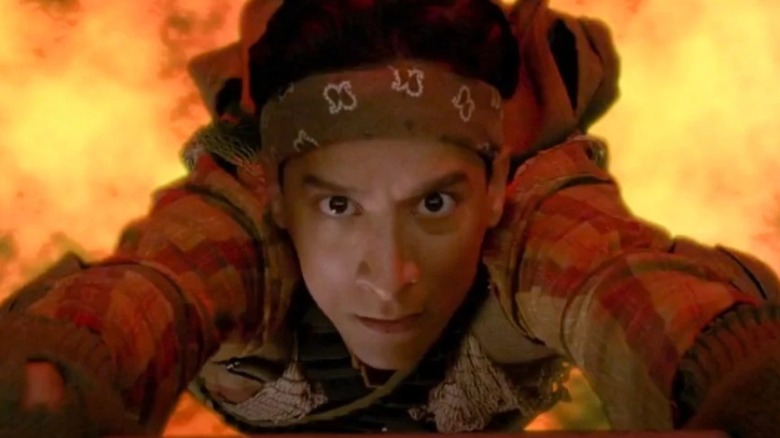
On its surface, "Community" was a sitcom about a ragtag Spanish study group at the struggling Greendale Community College who became friends and eventually formed a found family. However, the series evolved far past its basic premise into a meta-conversation with television by playing with the archetypes and tropes audiences had become accustomed to. The series also premiered in the fall of 2009 near the end of the Must See TV era and struggled to stay on the air throughout its run.
"Community" occupies a special place in history for its defiance during its battle with the network, making its six seasons and storied drama behind the scenes all the more impressive. The series helped launch the careers of cast members Donald Glover and Alison Brie, creator Dan Harmon, and executive producers Joe and Anthony Russo while helping to shape the cultural lexicon in hilarious and heartfelt ways. Here, we've gathered the 18 best episodes and ranked them from worst to best.
Basic Lupine Urology
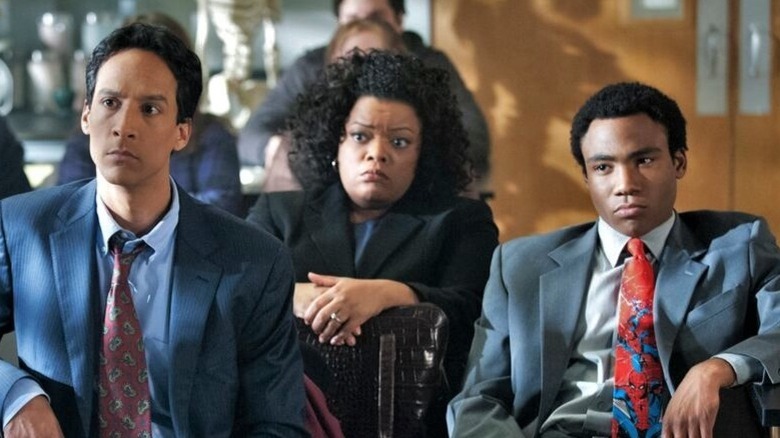
Season 3 introduces the too-soon departed character actor Michael K. Williams as the study group's soft-spoken, philosophical ex-con biology professor. When the study group's yam gets mysteriously destroyed, or "murdered" per Annie (Alison Brie), she insists they have the opportunity to find the killer to earn back their grade. This transforms the episode into a "Law & Order" homage, complete with opening credits and a musical theme to match. Troy (Donald Glover) and Abed (Danny Pudi) function as the buddy cops with Jeff (Joel McHale) and Annie as the attorneys working the case, and Shirley (Yvette Nicole Brown) as the no-nonsense chief.
Like the best of the series' homages, "Basic Lupine Urology" is expertly done, allowing for plenty of jokes that take the genre seriously while also developing important plot elements. In typical "Community" fashion, the episode's reality and imagination collide at the most surprising moments to expose darker truths. While Greendale is silly and cartoonish on the surface, the show never forgets what is at stake for the students and staff, using the failures of the school as opportunities to leverage plot and emotion at the most surprising times.
Pillows And Blankets
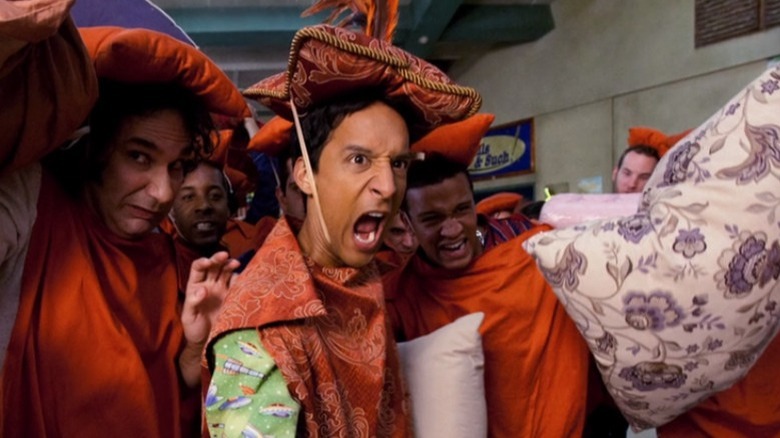
Sometimes the best art is made because of creative and financial constraints. The multi-arc plotline that explores the heartbreaking fight between best friends Troy and Abed culminates in a Ken Burns documentary-style battle with Abed leading the United Forts of Pillowtown against Troy's Legit Republic of Blanketsburg. Told through archival photos and narration from guest star Keith David, who expertly evokes the Burns aesthetic, this episode is different from the previous documentary homages.
The battle is small in scale. It's essentially a school-wide pillow fight but with grand emotional stakes in a thematic clash that typifies "Community's" unique chemistry. By anchoring Troy and Abed's friendship as the emotional center of the series, the episode maintains surprising realistic grounding despite the silly high-concept premise. Because "Community" was always a show willing to take risks, "Pillows and Blankets" also makes the audience believe in the stakes of the fight. Troy and Abed's friendship could very well be over. However, the episode's ultimate magic trick comes from Jeff, who chooses to save their friendship, not because of his role as a de facto leader, but because he's not willing to let go, either.
Studies In Modern Movement
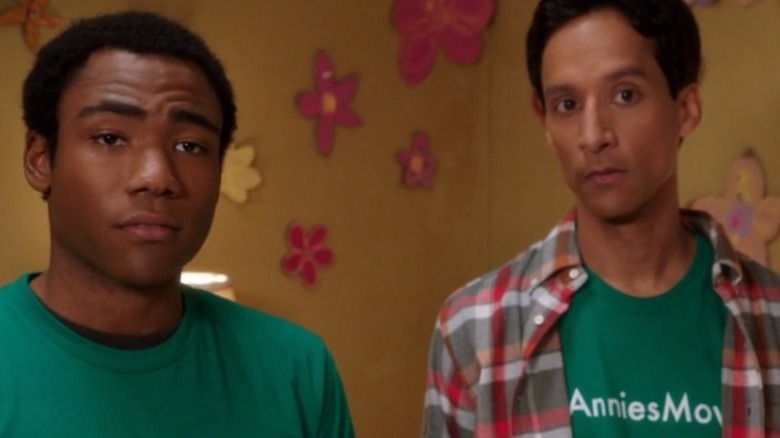
As the show went on, "Community" deepened its conversation not just with television, but also with its audience. While the series perennially struggled in the ratings, it always had a strong fanbase. "Studies in Modern Movement" sees perfectionist Annie move in with slapstick and childish Troy and Abed, who livetweet the day with the self-referential hashtag, #AnniesMove, winkingly encouraging the audience to do the same.
As Pierce (Chevy Chase) promises to get Annie's deposit back, and Jeff fakes being sick to skip out on the day entirely, Annie begins to regret her decision when the boys refuse to give up their "dreamatorium" to let her have a proper bedroom. The episode is a good example of the structure that "Community" would grow into outside of its straightforward genre pastiches. This more typical plot structure allowed for high-concept deviations like Pierce's paint-fumed musical hallucinations. However, it also presents the real-life struggle of being friends with people like Troy and Abed for someone as serious as Annie, a role reversal sitcoms rarely consider.
Digital Estate Planning
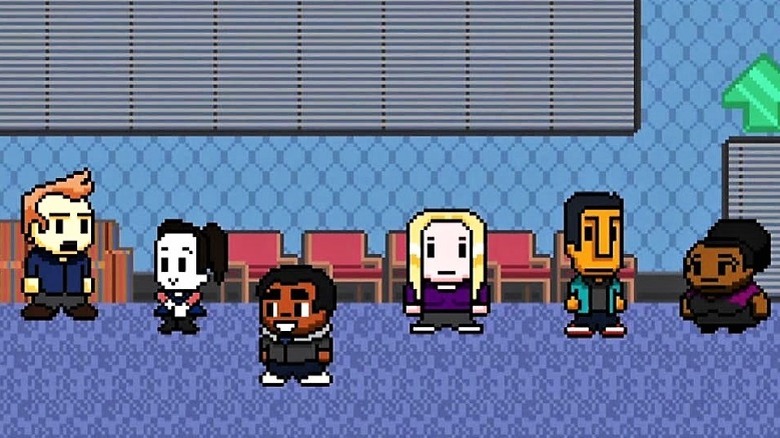
After Jeff "kills" Pierce's dad in "Advanced Gay," the Hawthorne heir is summoned along with the study group on a quest to earn his inheritance--by playing an '80s style 8-bit video game his eccentric father had created. The quest is overseen by his father's former right-hand man, Gilbert (Giancarlo Esposito), who is determined to keep Pierce from winning the game and the inheritance as he also vies for the top prize. In a rare show of solidarity for Pierce, the study group bands together, taking the audience on a pixelated adventure into the Hawthorne family psychodrama.
Unsurprisingly, Abed quickly hacks the game and turns it into a world he can understand and master. Meanwhile, Pierce and Gilbert face off as Gilbert finally confesses why he is so angry and invested — he's Pierce's secret illegitimate half-brother. It's a subversive but very realistic twist that reminds audiences of how wealthy, white families like Pierce's sometimes operate. Additionally, "Digital Estate Planning" also typifies the series' ethos. Regardless of how funny or beloved a character may be, everyone has flaws and imperfections. This all allows for a rare moment of humanity for Pierce, who is often a one-dimensional villain.
Conspiracy Theories And Interior Design
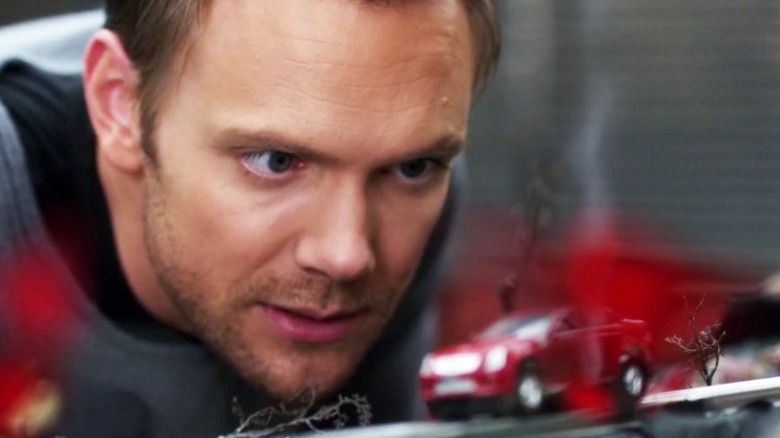
Jeff Winger is nothing if not a nihilistic and smart man. He's always happy to do the bare minimum to get by. When the dean (Jim Rash) discovers Jeff has enrolled in a fake class, the mysterious Professor Professorson (guest star Kevin Corrigan) emerges from the shadows in the nick of time to confirm Jeff's lie that he's taking a class with him at night school. To make matters stranger, Jeff has never met Professorson. This leads him and Annie down a winding path of conspiracies and revelations.
"Conspiracy Theories and Interior Design" hilariously plays with plot in a series of convoluted but rewarding twists. Corrigan is a bright spot, as he delivers ridiculous dialogue like "exchetera" with intense seriousness. Aside from the high concept mystery, the episode also sees Troy and Abed build a massive blanket fort, a running joke that returns with emotional impact later in the series. The episode is all the more impressive because the third act was written by Chris McKenna (who went on to co-write "Spiderman: Homecoming" and "Spiderman: No Way Home) and Harmon during filming, a testament to the unique talent behind the scenes.
Critical Film Studies
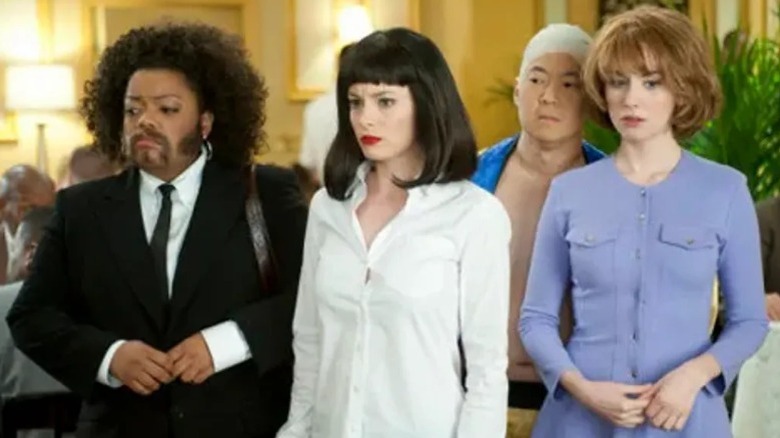
An impressive twofold homage, "Critical Film Studies" sees Jeff organizing a "Pulp Fiction"-themed surprise party for Abed. Unbeknownst to Jeff, Abed has plans of his own that include taking Jeff to dinner and opening up to him. He responds in kind, surprised at the depth of emotion he's sharing with his friend but soon realizes he's in the middle of a "My Dinner With Andre" homage. Meanwhile, the study group unravels at the diner waiting for them to arrive. Troy, in particular, is jealous and threatened by Jeff's perceived closeness with Abed.
The episode brilliantly juxtaposes Abed's own selfish desire to "do an homage" with Jeff's reticence to be vulnerable, bringing to light the unique dynamic of their relationship while adding more dimension to both of their characters. It also avoids the trappings of a convenient parody by focusing the primary plot of the episode on the subtler "Andre" homage. Yet, by incorporating musical stingers and costumes that nod to Quentin Tarantino at the diner, the episode has a unique blend of genres that elevates the series.
Advanced Dungeons And Dragons
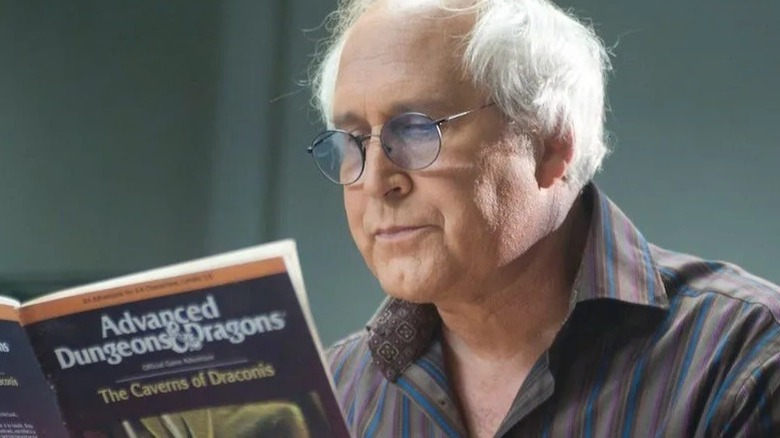
In "Advanced Dungeons and Dragons," the study group comes together to try to save one of Greendale's side characters, Neil (Charley Koontz), after they become concerned about his mental state. The group decides to engage with Neil by playing his favorite roleplaying game but doesn't invite Pierce, considering his general lack of sensitivity. The game and episode are immersive and fantastical, shot as a high fantasy "Lord of the Rings"-style epic, with Abed leading the group as dungeon master and Neil slowly regaining his confidence.
Yet, when Pierce discovers they've left him out, he stages a vengeful coup and shadow game to defeat Neil. The episode firmly (and rightly) cements Pierce as the villain of the study group, generating tension that would last for the remainder of Chevy Chase's tenure on the series. However, "Community" doesn't take the easy route. They also expose the flaws of the other study group members, Jeff in particular, making it an emotional episode in the midst of the incredibly funny and high stakes game.
Contemporary American Poultry
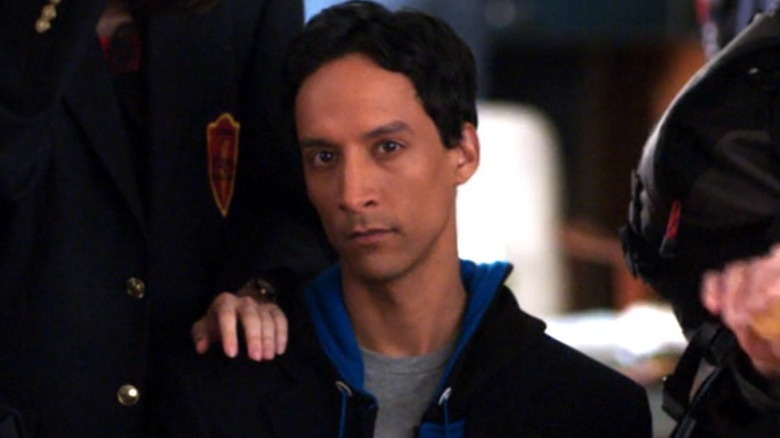
"Community" was a solid sitcom from the beginning, but the first season was structured as a straightforward rom-com about Jeff's pursuit of Britta (Gillian Jacobs) and the formation of the study group. "Contemporary American Poultry" was the first episode to bring the show's love of cinema to the forefront with a story focused on the study group's pursuit to get fresh chicken fingers, despite the cafeteria always running out.
A tribute to Mafia movies, the episode revolves around the study group's rise to the top of Greendale's social ladder after giving out chicken in exchange for goods. When Abed replaces Jeff as the head of the "family," Jeff is forced to take Abed out to restore balance. The episode expertly plays with genre. Abed's narration and the editing provide a snappy feel like "Goodfellas" and multiple shots reference "The Godfather." Not only is it a funny blueprint for what "Community" would become, but it also explores the dynamics of the study group. That's a balance that few other shows could accomplish.
Basic Intergluteal Numismatics
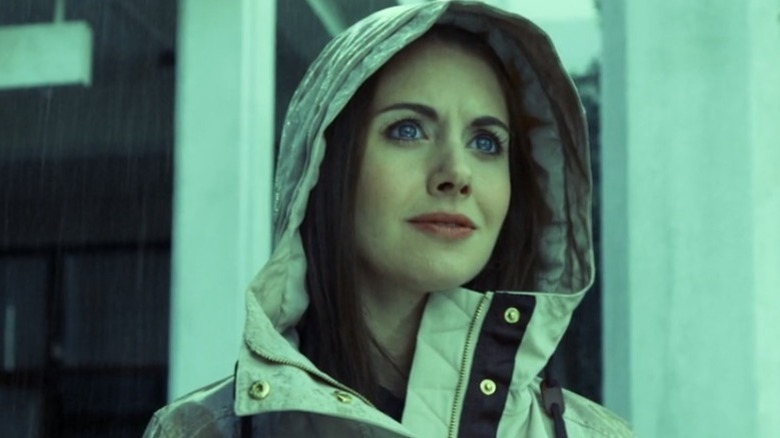
The Ass Crack Bandit should have been a throwaway joke, a casual reference only the most diehard "Community" fans know. Instead, the writers developed the runner into a full "Zodiac" homage based on one of the silliest premises possible: a mysterious figure who vandalizes Greendale by dropping coins into exposed butt cracks. The comedy excels largely because "Community" treats this absurd idea as Greendale's version of serial murder. While Jeff and Annie try to hunt down the ACB, Troy gets "cracked," with Glover providing a hilarious portrayal of a crime victim, remaining sitting in a wheelchair and wrapped in a blanket throughout the rest of the episode.
"Basic Intergluteal Numismatics" also sees the return of John Oliver's Professor Duncan, who is enlisted to build a profile of the ACB and help solve the case, the resurrection of Star Burns (Dino Stamatopolous), and a Ben Folds cameo. The back-to-back guest roles are a testament to the A-list talent "Community" recruited that amplified the show's chemistry. Like the best episodes of "Community," "Basic Intergluteal Numismatics" has emotional depth, exploring the dynamic between Jeff and Annie once again while ending with a cliffhanger that brings the study group back to earth.
Epidemiology
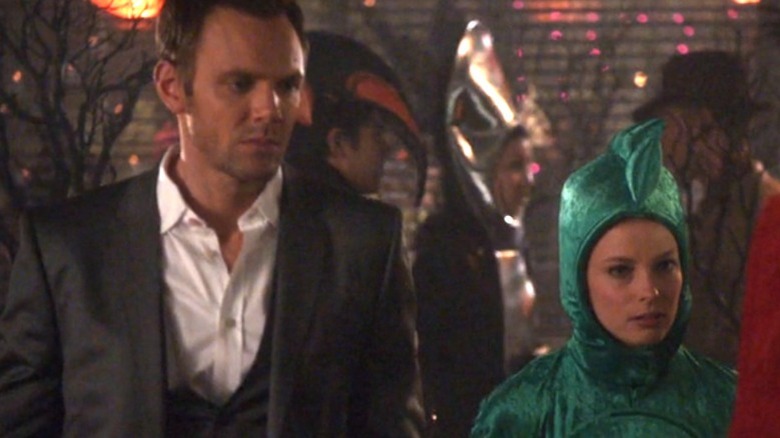
As "Community" expanded into more film genre riffs, it was faced with the challenge of incorporating these exploits into the show's larger canon. Perhaps the most impressive of these feats is "Epidemiology," a full blown zombie movie set in a Greendale Halloween party. When the study group shows up to the party, tensions rise to the surface. Troy decides to abandon his nerdy costume, with Abed in favor of trying to seduce girls, and Shirley is upset that no one gets her costume. After everyone eats discounted food from the local military base, grows feverish, and develops a taste for human flesh, the tensions in the group only heighten.
Set to the Dean's ABBA playlist, the episode manages to be a genuinely scary zombie movie while also raising the stakes in the study group. "Epidemiology" is a breathtaking feat of bravery in establishing what would be possible within the world of Greendale. Not for nothing, the episode also gives Glover's Troy room to shine as an action hero, providing a glimpse at the star he was destined to become.
Cooperative Polygraphy
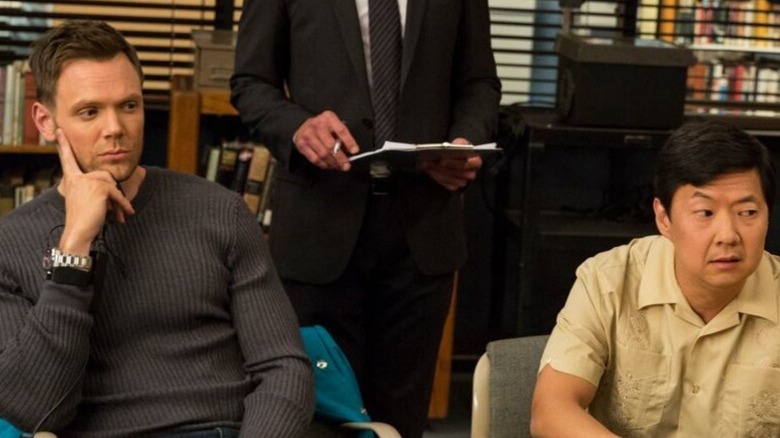
Season 5 saw the return of Dan Harmon after the "gas leak" year but was also the beginning of a series of cast departures, beginning with Chevy Chase. Though Chase officially exited the series in the middle of Season 4, Pierce wasn't killed off-screen until the end of the prior episode. "Cooperative Polygraphy" picks up after the study group attends Pierce's funeral and is visited by the mysterious Mr. Stone (guest star Walton Goggins). The administrator oversees a series of polygraph tests to clear the study group of Pierce's murder and issue them their inheritances per Pierce's will.
It's a fitting final manipulation from the beyond as Mr. Stone's questions seem focused on turning the study group against each other. Dark secrets like the true origins of Troy and Abed's special handshake and Annie's history of drugging the group for finals rise to the surface. However, the show also pays tribute to one of its most complex characters through the "final bequeathals" which range from classic callbacks to heartfelt confessions. As the group reckons with what Pierce meant to them, the series also acknowledges what it means to move forward without him.
Abed's Uncontrollable Christmas
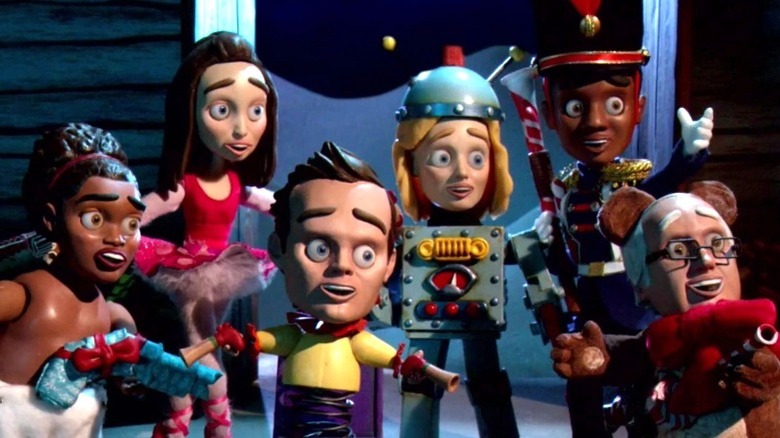
Regardless of genre, "Community's" best episodes dive into deeper emotional truths about the characters. When the fall semester wraps up and everyone is ready to leave for the holidays, Abed pulls the study group back in with an old-fashioned stop-motion musical hallucination. A further delusion than Abed's typical pop culture references draws the study group's concerns. Professor Duncan stages a sort of intervention for his own selfish gain in the hopes of publishing a study on "Abed's Uncontrollable Christmas."
Amid the incredibly dark subject matter is a Christmas adventure through Abed's subconscious as the study group works to help him navigate his psyche — for better or worse. On the surface, Abed seems like an unemotional character, However, this episode allows the audience to see what's behind the mask, providing new depth to a beloved character. With memorable songs and beautiful nostalgic stop-motion animation, this episode is a timeless classic.
A Fistful Of Paintballs — For A Few Paintballs More
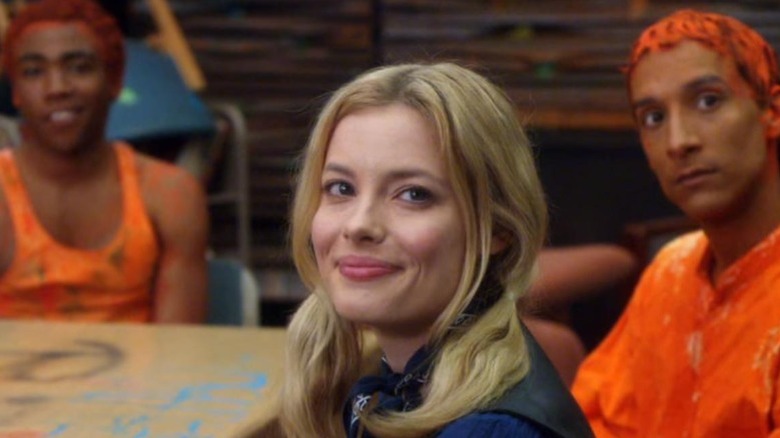
Paintball is as much a part of "Community" as Winger pep talks and pop culture references, with every season having some variation of the colorful battle. The epic two-part second season finale sees Greendale playing paintball in competition for a $100,000 cash prize thanks to a costumed figure named Pistol Patty, soon revealed to be the dean of the rival City College. While "Modern Warfare" saw everyone at Greendale (and the study group in particular) turn against each other for a chance at priority registration, this paintball battle focuses on Greendale banding together to save their school from City College, an underdog theme that emerges as the series continued to fight its own network.
"A Fistful of Paintballs" is a Spaghetti Western homage and "For a Few Paintballs More" is a weirdly fitting Star Wars pastiche. Yet, both episodes work to display the tensions in the study group after they've taken a vote to kick out Pierce. Most notably, the two-parter underscores Greendale's commitment to their school when confronted by outsiders. The brilliance of this paintball episode is the way it allows every character, even Leonard (Richard Erdman) and Quendra (Marcy McCusker), to shine.
Geothermal Escapism
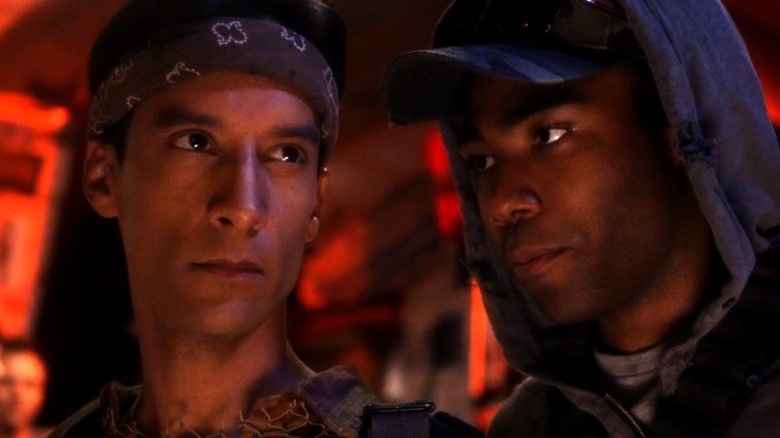
Troy is set to leave Greendale to sail around the world to inherit Pierce's fortune. Meanwhile, Abed and the study group are faced with another tough goodbye. While everyone wants to make the most of Troy's remaining time, armchair psychologist Britta is determined to make sure the best friends have closure. She's concerned about Abed in particular. Her plans are waylaid when Abed creates a school-wide game of "floor is lava" as a going-away gift for Troy.
On its face, this episode is not too different from the paintball episodes. However, it has a hilarious dystopian "Mad Max" feel, as Greendale quickly forms a lava-centric society, with Britta as the sole voice of reason. Of course, the centerpiece is Troy's departure, and Donald Glover's exit from the series, one of the most emotional moments of "Community's" entire run. Troy's goodbye as he sails off into the sunset with Levar Burton is incredibly fitting, allowing for him and Abed to find themselves.
Paradigms Of Human Memory
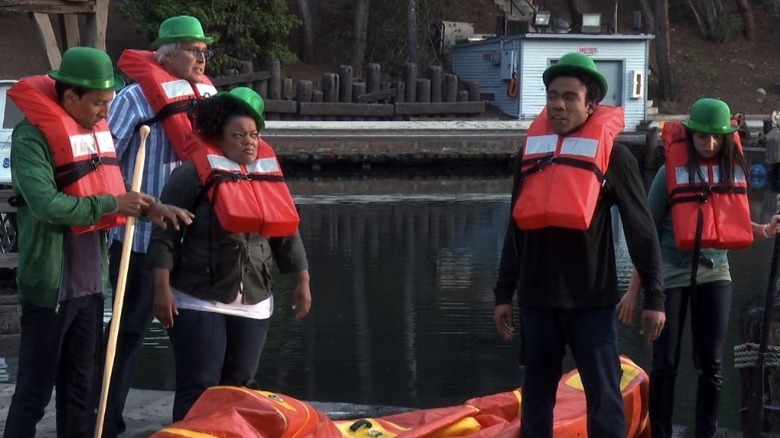
As the study group works on their final anthropology diorama (in true meta style, the diorama is of them making a diorama), Chang (Ken Jeong) finds the cache of objects that Troy's one-time pet monkey, Annie's Boobs, has hidden in the vents of Greendale. This simple premise leads to a clip show of flashbacks. As always, nothing is ever what it appears to be. Though clip shows are historically a cost-saving measure, "Paradigms of Human Memory" presents all new footage, utilizing the form to comment on television and heighten the tension in the study group.
As the group reflects and discovers Jeff and Britta's ongoing hookup, they blame them for the problems they've faced all year, like the group's failed and previously unseen Habitat for Humanity project. The self-serving pair gladly use the flashbacks to point out everyone else's worst moments, including Abed's fixation with the real short-lived series "The Cape." Above all else, the episode is impressive for its unbelievable number of jokes and high production values.
Cooperative Calligraphy
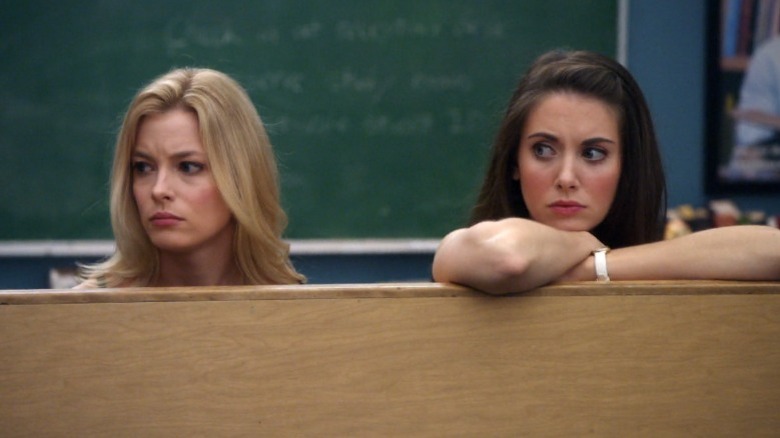
Through the show's conversation with television, "Community" fans became versed in the medium through episodes that referenced specific tropes and formats. One of the best examples of this is the meta episode "Cooperative Calligraphy." Bottle episodes are typically a way for shows to save money by not shooting on multiple sets, which "Community" leveraged by acknowledging it within the plot of the episode. While the rest of the study group is desperate to go to Greendale's puppy parade, Annie's fixation on finding her pen keeps them confined to the study room, which Abed openly acknowledges as the group "doing a bottle episode."
The structure is once again a starting point for more to take place, as the interrogation and investigation explore character dynamics and reveal hidden truths in the group. Annie's passive-aggressive innocence and morality are a juxtaposition of the rest of the characters' ethoses. The glimpse of the puppy parade in the episode's tag, the only scene outside of the study room, is also well worth the wait, even if the study group never makes it there.
Documentary Filmmaking: Redux

There are a few film and TV homages that "Community" repeated with varying success, but "Documentary Filmmaking: Redux" is easily the best of the three documentary episodes. When the Dean is tasked with shooting an updated commercial for Greendale, he enlists and traps the entire school for the project, with Abed filming the drama behind the scenes. This episode is a rare spotlight for Rash's Dean Pelton to be more than a shallow goofy foil. Structured as an "Apocalypse Now" homage, the episode shows his depth and love for the school, even amidst his own internalized intellectual superiority.
Greendale is a character itself, the punching bag that only its students and employees can beat up. Within the brilliant context of a commercial focused on the school and a documentary focused on the dean, the episode dissects his complex relationship with the school, adding new layers to one of the show's funniest recurring characters. Additionally, the episode finally cashes in on Greendale's Luis Guzman statue, bringing the incredible character actor to campus for the commercial in a pivotal and memorable cameo.
Remedial Chaos Theory
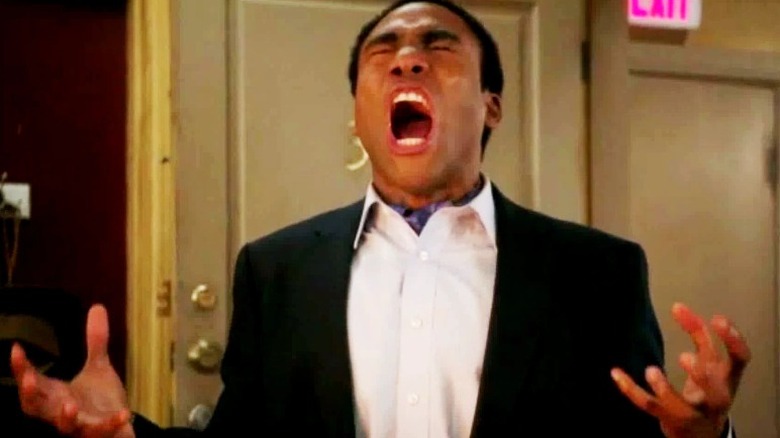
Remarkably, "Community" is a cult favorite that manages to permeate the larger popular culture, with "Remedial Chaos Theory" perhaps being the prime example. When the study group goes to Troy and Abed's new apartment for a housewarming party, Jeff suggests they roll a die to determine who has to go downstairs to get the pizza. His proposal elicits a warning from Abed that Jeff is creating six different timelines. Another brilliant script from Dan Harmon and Chris McKenna explores every possible timeline created from the die roll.
While some timelines have similarities that examine Jeff and Annie's romantic tension and the group's overall disdain for Shirley's baking, they also vary widely. The most famous timeline produced is the highly-memed moment of Troy walking in with the pizza to find the room on fire. Abed's warning to Jeff also sparked the now popular phrase "the darkest timeline," an emotional concept that would grow within the show. "Remedial Chaos Theory" produced too many hilarious and smart moments to list, cementing it as the best episode of "Community."
Read this next: The 15 Best Comedy Duos Of All Time
The post The 18 Best Community Episodes, Ranked appeared first on /Film.
